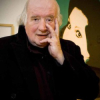Dave Hickey

Dave Hickey
David Hickeyhas written for many American publications including Rolling Stone, Art News, Art in America, Artforum, Harper's Magazine, and Vanity Fair. Nicknamed "The Bad Boy Of Art Criticism” and “The Enfant Terrible Of Art Criticism”, he was formerly Professor of English at the University of Nevada Las Vegas and Distinguished Professor of Criticism for the MFA Program in the Department of Art & Art History at the University of New Mexico...
NationalityAmerican
ProfessionCritic
Date of Birth5 December 1940
CountryUnited States of America
Where do you learn how to act? Not at church. America is a lot more like pagan Rome than we think. We still sacrifice to objects to gain our social goals.
I think that if you don't like something and it's not easy, you shouldn't be doing it.
I don't think the government should touch art. Governments are risk averse. They encourage risk-averse personalities to be artists.
Art and writing come from somewhere down around the lizard brain. It's a much more peculiar activity than we like to think it is. The problems arise when we try to domesticate the practice, to pretend that it's a normal human activity and that "everybody's creative." They're not.
In my experience, you always think you know what you're doing; you always think you can explain, but you always discover, years later, that you didn't and you couldn't. This leads me to suspect that the principal function of human reason is to rationalize what your lizard brain demands of you. That's my idea.
I hate all that woozy political and psychotherapeutic crap applied to books and art.
Martha Stewart contributes more to our civility than the Baptist Church.
Art editors and critics - people like me - have become a courtier class.
If I go to London, everyone wants to talk about Damien Hirst. I'm just not interested in him. Never have been.
As my friend Jeremy Gilbert-Rolfe has argued persuasively, there is an element of positivity in the visible world, and in color particularly, that totally eludes the historicity of language, with its protocols of absence and polarity. The color red, as an attribute of the world, is always there. It is something other than the absence of yellow and blue--and, thus, when that red becomes less red, it becomes more one or the other. It never exists in a linguistic condition of degradation or excess that must necessarily derive from our expectations.
My mother was an economics professor. I'm proficient in math, and statistics, game theory, symbolic logic and all of that.
I'm retiring because my time is up.
In images,... beauty was the agency that caused visual pleasure in the beholder; and any theory of images that was not grounded in the pleasure of the beholder begged the question of their efficacy and doomed itself to inconsequence.
The idea of political content is irrelevant. Content is irrelevant. I always tell my students, "Never forget you're writing words! You know, word one, word two, word three, word four. The words have to be organized. Nothing else does."